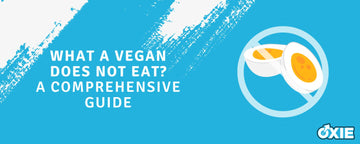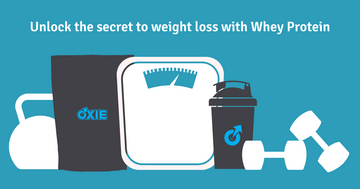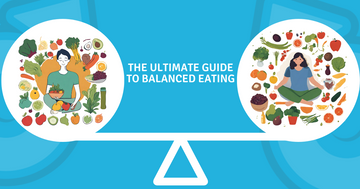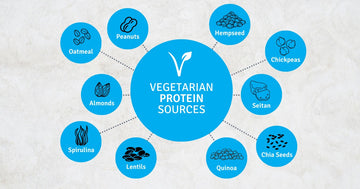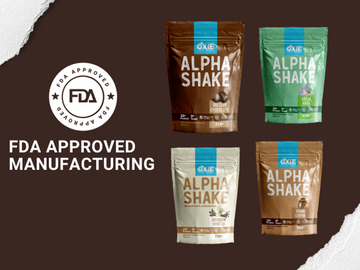What food does a vegan not eat? A Complete Manual
Vegans have made the deliberate choice to live a life free of any form of animal products. This includes dairy products, eggs, honey, fish, and meat. Else, what is not allowed on a vegan diet? In this post, we'll look at the vegan diet's restrictions and what it doesn't allow. A plant-based diet known as a vegan diet forgoes all dairy, meat, eggs, and honey as well as all other animal products. This dietary decision is frequently driven by moral, environmental, and health considerations, as well as a desire to lessen animal suffering.
Additionally, we'll also explore some vegan-friendly protein sources and highlight some delicious products from Oxienutrition that can help you stick to your vegan diet.
However, for some people, the decision to go vegan can be challenging because it requires a major shift in the way they think about food. In this article, we'll also explore some of the reasons why and what should vegetarians not eat.
Ethical concerns
For many vegans, the main reason they choose not to eat animal products is because they believe it is wrong to use animals for food, clothing, or any other purpose. Vegans believe that all animals, regardless of their size or intelligence, deserve to be treated with respect and kindness.
They see the exploitation of animals for food as cruel and unnecessary, and feel that it's their responsibility to reduce the demand for animal products by avoiding them in their diet.
Environmental concerns
In addition to ethical concerns, many vegans choose not to eat animal products because of the negative impact that animal agriculture has on the environment. Animal agriculture is a major contributor to greenhouse gas emissions, deforestation, soil erosion, and water pollution, and it requires a large amount of land and resources to produce meat, dairy, and eggs.
By choosing a vegan diet, individuals can reduce their carbon footprint and help protect the environment.
Health concerns
For some vegans, health is a major factor in their decision to avoid animal products. Research has shown that a well-planned vegan diet can be healthy and nutritionally complete, providing all the essential nutrients needed for good health.
Additionally, plant-based diets are often lower in saturated fat and higher in fiber, antioxidants, and other nutrients that are associated with a lower risk of heart disease, certain cancers, and other chronic health conditions.
Personal preference
Finally, some vegans choose not to eat animal products simply because they don't like the taste or texture of meat, dairy, or eggs. For these individuals, a vegan diet is a way to enjoy a wide range of delicious, plant-based foods while still feeling good about their dietary choices.
There are many reasons why vegans choose not to eat animal products. Whether it's due to ethical, environmental, health, or personal preference, going vegan can be a positive and fulfilling choice for those who are committed to making a difference in the world. By avoiding animal products and choosing plant-based alternatives, vegans can enjoy delicious, nutritious food while making a positive impact on the world.
Learn about what do vegans not eat or drink
Does a vegan eat non veg?
Vegans abstain from all animal meat, including chicken, lamb, beef, and pork. They also stay away from processed meats like bacon, ham, and sausage. Finding substitute sources of protein, such as organic proteins, lentils, and whole grains, is crucial for vegans.
Vegans abstain from eating poultry and meats for a number of reasons, including moral, ecological, and health considerations.
Many vegans feel that using and killing animals for food is wrong from an ethical perspective. They hold that humans have no right to take the life of any animals, including cows, chickens, and pigs, and that all animals have the right to exist in peace.
The raising of livestock and poultry may be detrimental to the environment. Animal agriculture is a factor in environmental issues like destruction of natural habitats, soil degradation, water contamination, and greenhouse gas emissions.
Some vegans choose not to consume meat or poultry due to health reasons as well. The body can get all the nutrients it requires from a well-planned vegan diet, and several studies have found a correlation between eating a lot of animal products and a higher likelihood of certain illnesses like cardiovascular disease, obesity, and some types of cancer.
These are only a small number of the various reasons why someone can decide to forego meat, and it's important to remember that every vegan has their own special reasons for adopting a plant-based diet.
Do they eat Fish and Seafood ?
Vegans also do not consume fish or seafood, including shellfish and any other sea creatures. This can be a challenge for those who enjoy the taste of seafood, but there are many delicious plant-based alternatives available, such as tofu, tempeh, and seitan.
Vegans avoid fish and seafood for a variety of reasons, including ethical, environmental, and health concerns.
From an ethical perspective, many vegans believe that all forms of animal exploitation, including the fishing industry, are wrong. They believe that fish and other sea creatures have the capacity to feel pain and suffer, and that humans have no right to take their lives.
From an environmental perspective, the fishing industry can have a negative impact on the world's oceans and marine ecosystems. Overfishing, habitat destruction, and the use of destructive fishing practices can lead to the decline of fish populations and harm marine ecosystems.
Health concerns can also play a role in a vegan's decision to avoid fish and seafood. While fish and seafood can be a good source of omega-3 fatty acids, they can also contain harmful pollutants such as mercury and other toxic chemicals.
DO vegans not eat eggs and cheese ?
Veganism is a lifestyle and dietary choice that involves avoiding the use of animal products or by-products which includes dairy products such as milk, cheese, yoghurt, and cream.
This also applies to eggs and items made with eggs, such as custard and mayonnaise. Vegans can choose plant-based milks such oat milk, almond milk, and soy milk to substitute dairy. There are numerous vegan-friendly egg alternatives available, including flax eggs, chia eggs, and the liquid from a can of chickpeas.
Dairy and eggs are avoided by vegans for a range of reasons, such as moral, ecological, and health considerations. Many vegans think it's unethical to use livestock for their milk and eggs, from an ethical standpoint. According to them, people have really no right to take the lives of cows, hens, or any other animal or their reproductive organs. They also believe that all animals, including cows and hens, have the right to exist without suffering.
Production of dairy products and eggs has the potential to be harmful to the environment. Animal agriculture is a factor in environmental issues like deforestation, soil erosion, water pollution, and greenhouse gas emissions.
A vegan's choice to abstain from dairy and eggs may also be influenced by health considerations. Since dairy products have been associated to an increased risk of some health issues, such as heart disease and various types of cancer, a well- planned vegan diet can offer the body all the nutrients it requires.
Do vegans eat Honey and Gelatine?
Honey is not vegan because it is produced by bees and is considered an animal product. Vegans opt for alternative sweeteners, such as maple syrup, agave nectar, or coconut sugar.
Gelatine is a common ingredient found in many products, such as jelly, candy, and marshmallows. It is made from animal collagen and is not suitable for vegans. Vegan-friendly alternatives include agar agar and carrageenan.
Do you think vegans don't eat protein?
It is a common misconception that vegans cannot get enough protein on their diet, but this is simply not true. While animal-based products are often high in protein, they are not the only source of protein available. There are many plant-based foods that are also high in protein, making it possible for vegans to consume enough protein to meet their nutritional needs.
It is important for vegans to pay attention to their protein intake and to eat a variety of protein-rich foods to ensure they are getting all of the essential amino acids the body needs. This can be easily achieved by eating a variety of protein-rich foods throughout the day and incorporating protein-rich vegan foods into each meal.
It's also worth noting that many vegans choose a plant-based diet for reasons beyond just protein. For example, they may be motivated by ethical concerns related to the treatment of animals, environmental concerns related to animal agriculture, or health concerns related to the consumption of animal products.
As a vital food, protein aids in the production of enzymes and hormones, supports a healthy immune system, and helps to build and repair tissues. Especially if they participate in frequent physical activity, vegans must make sure they have adequate protein in their diet.
Excellent sources of vegan-friendly protein include:
- Legumes (such as beans, lentils, and chickpeas)
- Whole grains (such as brown rice, and whole wheat bread)
- Seeds and nuts (such as chia seeds, and pumpkin seeds)
- Vegan protein powders (such as pea protein, and soy protein)
Oxie Nutrition: Delicious Vegan-Friendly Protein Sources
If you're looking for a convenient and delicious way to get more protein in your vegan diet, Oxie nutrition has got you covered. Here are four of their top products that are perfect for vegans who want to stay on track while still enjoying delicious snacks and treats.
Oxie Nutrition's Chocolate Peanut Butter
This creamy and delicious peanut butter is made with the most premium ingredients including roasted peanuts and organic cocoa. It's high in protein and a great source of healthy fats, making it a perfect snack for vegans who need a quick energy boost. Spread it on toast, use it as a dip for fruit, or mix it into your smoothies for a delicious chocolatey twist.
Oxie Nutrition's White Chocolate Peanut Butter
For those with a sweet tooth, Oxie nutrition's white chocolate peanut butter is the perfect treat. It's made with the same high-quality ingredients as their chocolate peanut butter, but with the added sweetness of white chocolate. It's a great alternative to traditional sweet spreads and can be used in baking, cooking, or just as a snack.
Oxie Nutrition's OG Peanut Butter
For those who like to keep things simple, Oxie nutrition's OG peanut butter is the perfect choice. It's made with just two ingredients: roasted peanuts and organic salt. It's high in protein and healthy fats, and is a great option for vegans who prefer a more natural, unsweetened nutty taste.
Conclusion:
Vegans have a wide range of restrictions when it comes to their diet, but that doesn't mean they have to miss out on delicious food. By replacing animal- derived products with plant-based alternatives and finding vegan-friendly protein sources, it's easy to stick to a vegan diet while still enjoying delicious meals and snacks. And, with products like Oxie nutrition's range of vegan friendly peanut butters you can get the protein and energy you need to support your active lifestyle.

